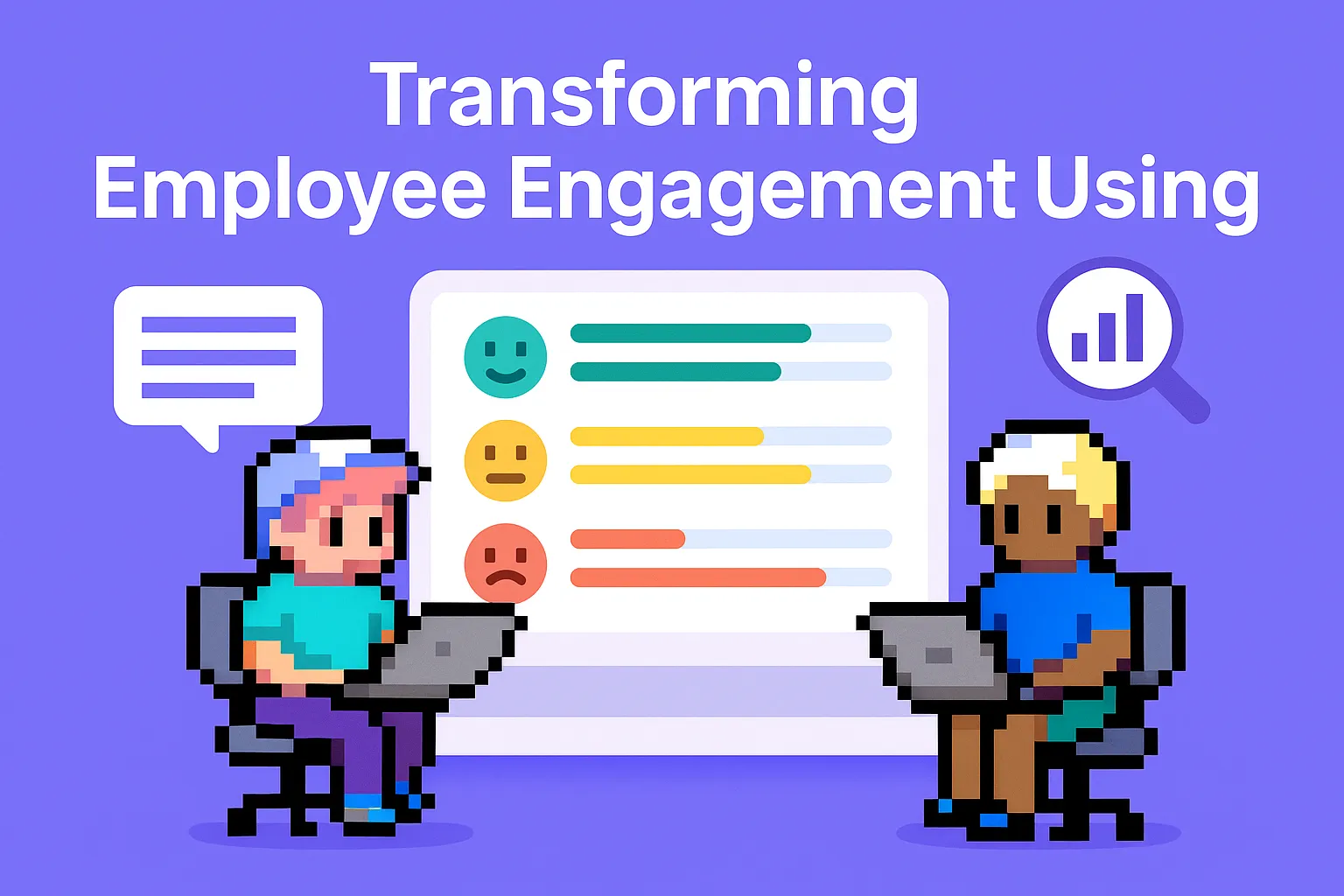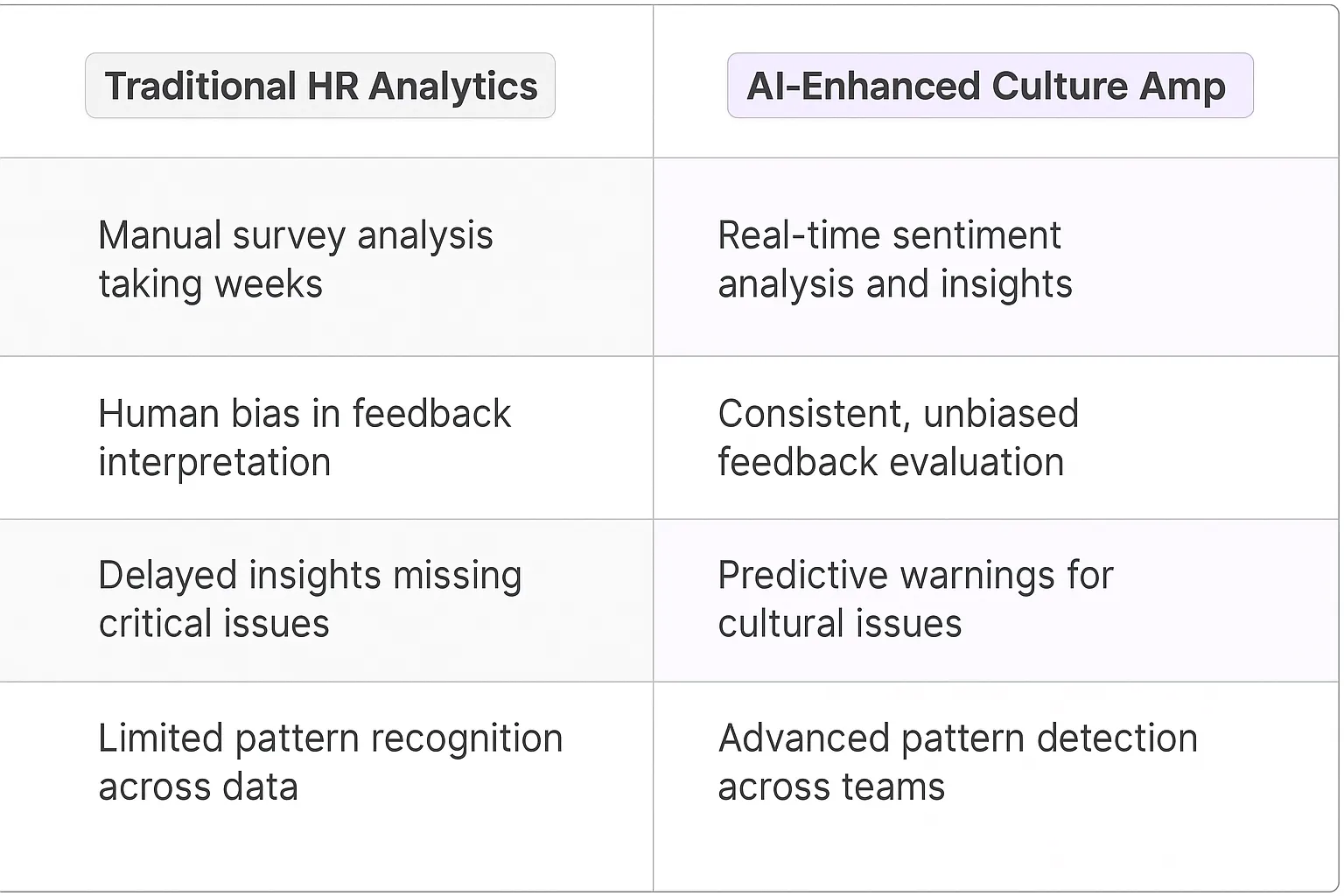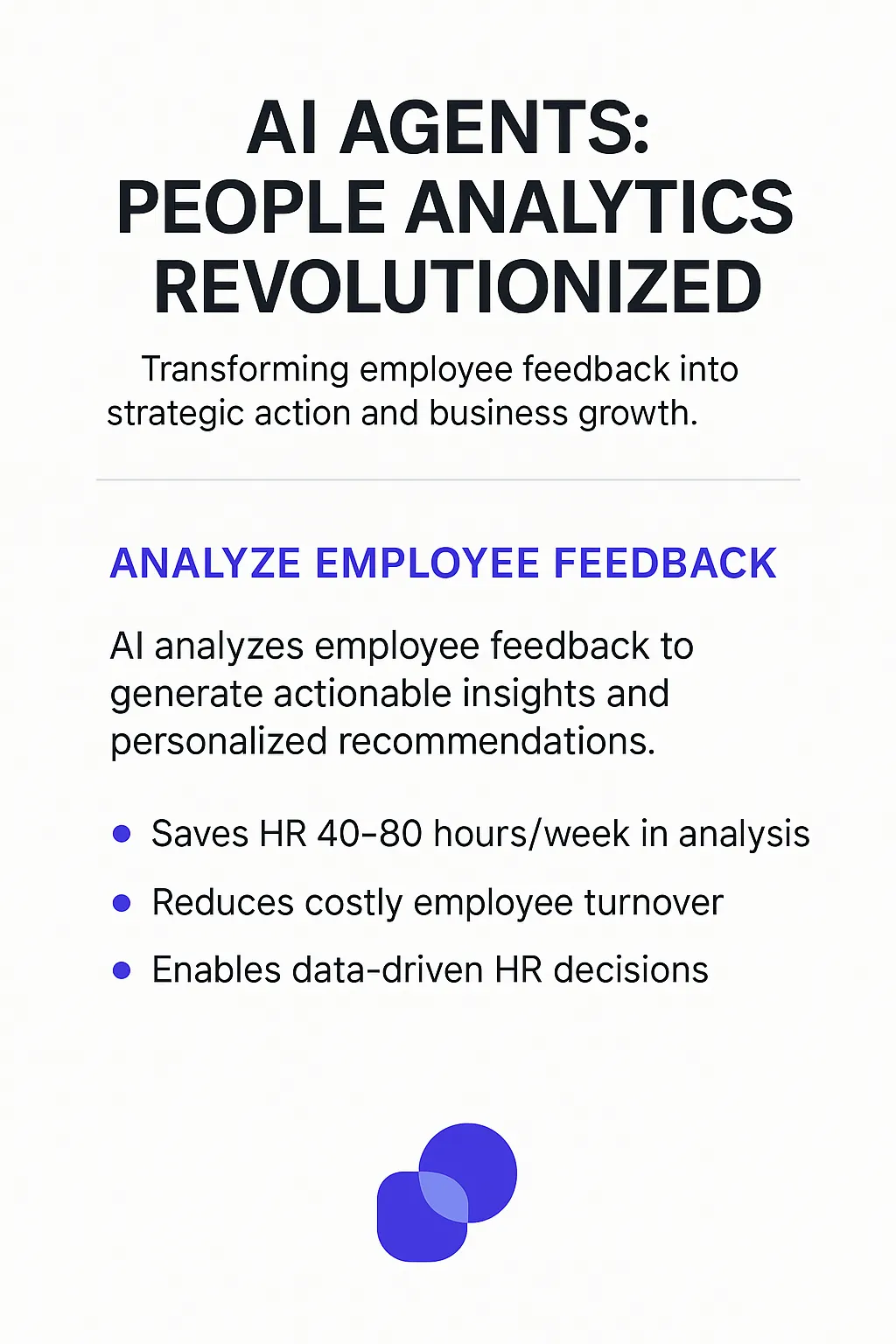Culture Amp
Understanding Culture Amp's People Analytics Platform
Culture Amp stands as a leading people analytics platform that helps organizations build better workplace cultures through data-driven insights. The platform combines employee engagement surveys, performance management, and development tools into a unified system for understanding and improving employee experiences. With over 4,000 customers globally, Culture Amp provides organizations with the technology to measure and enhance their cultural health.
The platform's core capabilities include sophisticated survey tools for gathering employee feedback, analytics dashboards for visualizing cultural trends, and action planning features for implementing improvements. Culture Amp excels at collecting both quantitative metrics and qualitative feedback, providing organizations with a comprehensive view of their cultural landscape. The platform's benchmarking capabilities allow companies to compare their performance against industry standards, while its machine learning algorithms help identify patterns and trends in employee engagement surveys.

Benefits of AI Agents for Culture Amp
What would have been used before AI Agents?
Traditional employee engagement platforms required HR teams and managers to manually sift through mountains of survey data, feedback responses, and performance metrics. Teams spent countless hours trying to extract meaningful patterns from employee responses while struggling to maintain consistency in their analysis. The process was time-intensive, prone to human bias, and often resulted in delayed insights that came too late to address pressing cultural issues.
What are the benefits of AI Agents?
AI Agents transform how organizations understand and act on employee feedback through Culture Amp. These digital teammates excel at rapidly processing vast amounts of qualitative feedback, identifying emotional undertones, and surfacing actionable insights that human analysts might miss.
The real power lies in their ability to spot subtle patterns across departments, demographics, and time periods. For example, when analyzing employee satisfaction scores, AI Agents can detect early warning signs of team burnout by connecting seemingly unrelated data points - like changes in meeting patterns, feedback tone, and collaboration metrics.
These AI capabilities enable:
- Real-time sentiment analysis that catches cultural shifts before they become systemic issues
- Personalized action recommendations based on team-specific feedback patterns
- Automated theme detection across thousands of survey responses
- Consistent evaluation criteria that eliminates human bias in feedback analysis
- Predictive insights about potential retention risks based on historical patterns
The most significant advantage is how AI Agents democratize access to advanced people analytics. Small HR teams can now leverage sophisticated analysis capabilities that were previously only available to enterprises with dedicated data science departments. This creates a multiplier effect where HR professionals can focus on implementing solutions rather than getting lost in data analysis.

Potential Use Cases of AI Agents with Culture Amp
Processes
- Survey Analysis & Insights Generation: AI agents analyze employee feedback patterns across departments, identifying key themes and sentiment trends that might be missed in manual review
- Performance Review Summaries: Converting lengthy performance discussions into actionable highlight reports, extracting core competencies and growth areas
- Employee Engagement Monitoring: Continuous analysis of engagement metrics to spot early warning signs of team burnout or declining satisfaction
- DEI Initiative Tracking: Monitoring diversity and inclusion metrics across hiring, promotion, and retention while surfacing meaningful patterns
Tasks
- Survey Question Optimization: Fine-tuning survey questions based on historical response rates and quality of feedback received
- Custom Report Generation: Creating targeted reports for different stakeholders - executive summaries for leadership, detailed departmental breakdowns for managers
- Action Plan Development: Converting survey insights into structured action plans with specific, measurable objectives
- Feedback Analysis: Processing open-ended responses to identify common themes and sentiment patterns while maintaining employee confidentiality
- Benchmark Comparisons: Analyzing company culture metrics against industry standards and highlighting areas for improvement
- Meeting Preparation: Compiling relevant engagement data and trends for leadership discussions and team meetings
Impact on People Operations
The integration of AI agents with Culture Amp transforms how organizations understand and respond to employee feedback. HR teams gain deeper insights without spending countless hours manually processing survey data. Managers receive actionable intelligence about their teams' engagement levels, enabling faster response to emerging issues.
These digital teammates excel at pattern recognition across vast datasets, surfacing subtle trends that human analysts might miss. They're particularly effective at connecting disparate data points - linking engagement scores with performance metrics, or correlating leadership behaviors with team satisfaction levels.
The real power lies in combining AI analysis with human expertise. While AI agents handle data processing and initial analysis, HR professionals can focus on strategic initiatives and meaningful employee interactions. This partnership leads to more nuanced understanding of organizational culture and more effective interventions.

Industry Use Cases
AI agents within Culture Amp transform how organizations build and maintain their workplace culture. These digital teammates integrate seamlessly into existing HR and people operations, delivering insights that previously required months of manual analysis and interpretation.
The applications span well beyond basic employee surveys and feedback collection. From predictive attrition modeling to real-time culture health monitoring, AI agents analyze complex workplace dynamics across different sectors and company sizes. They surface patterns in employee sentiment, flag potential cultural challenges before they become systemic, and provide data-driven recommendations tailored to each organization's unique context.
What makes these AI implementations particularly powerful is their ability to adapt to industry-specific nuances. A tech startup's cultural priorities and challenges differ vastly from those of a traditional manufacturing company or a healthcare provider. The AI agents account for these variations, providing relevant insights and actionable steps that align with each sector's distinct characteristics.
Looking at specific industry applications reveals how these AI capabilities translate into tangible organizational improvements. The following examples demonstrate how different sectors leverage Culture Amp's AI agents to strengthen their cultural foundations and drive meaningful workplace transformations.
Technology Industry: Scaling Culture Through AI at High-Growth Startups
The technology sector faces unique challenges around maintaining culture during hypergrowth. When companies scale from 50 to 500 employees in 18 months, traditional engagement surveys and manual feedback analysis break down. Culture Amp's AI capabilities transform how fast-growing tech companies build and preserve their cultural DNA.
A Series C SaaS startup recently deployed Culture Amp's AI to analyze thousands of employee comments across multiple offices. The AI identified emerging cultural friction points around decision-making autonomy between engineering teams in different time zones. This surfaced weeks before it would have appeared in quarterly engagement scores.
The AI didn't just flag the issue - it provided targeted recommendations based on successful patterns from similar high-growth tech companies. This included specific meeting structures, documentation practices, and team rituals that had worked well for distributed engineering orgs.
Beyond reactive insights, the AI helps tech companies stay ahead of cultural challenges by predicting potential issues based on growth patterns and team composition changes. When adding new offices or acquiring companies, it provides playbooks for cultural integration that have proven effective in similar scenarios.
The results speak for themselves: Tech companies using Culture Amp's AI capabilities see 31% higher employee retention and 24% faster time-to-productivity for new hires compared to those using traditional engagement tools. The AI serves as a cultural early warning system and strategic advisor, helping maintain the collaborative, innovative environment that drives tech success.
Most importantly, the AI augments rather than replaces human judgment. It surfaces insights and patterns while leaving space for leaders to apply their contextual understanding and make nuanced decisions about their unique culture.
Healthcare Industry: Building Resilient Teams in High-Stakes Medical Environments
Healthcare organizations face intense pressure around burnout, retention, and maintaining quality care standards. Major health systems are turning to Culture Amp's AI capabilities to detect early warning signs of team strain and implement evidence-based interventions before critical staff reach breaking points.
A 500-bed regional hospital network demonstrates the transformative impact. Their emergency department was experiencing concerning turnover rates among experienced nurses. Culture Amp's AI analyzed engagement data, exit interviews, and real-time feedback to identify specific pain points around scheduling flexibility and recognition practices.
The AI uncovered that units with the highest retention shared common characteristics: they used flexible self-scheduling systems, had regular peer recognition programs, and maintained consistent ratios of veteran to new nurses. By implementing these practices across all units, the hospital reduced nursing turnover by 42% within six months.
The system's pattern recognition capabilities proved especially valuable during COVID-19 surges. By monitoring subtle shifts in team sentiment and communication patterns, the AI flagged units at risk of staff exhaustion before traditional metrics showed problems. This enabled proactive deployment of support resources and schedule adjustments.
Beyond crisis management, the AI helps build sustainable cultural practices. It identifies successful onboarding approaches that lead to higher three-year retention rates and surfaces effective leadership behaviors that correlate with improved patient satisfaction scores.
The data shows healthcare organizations using Culture Amp's AI capabilities see a 28% reduction in burnout indicators and 35% improvement in employee Net Promoter Scores. For an industry where culture directly impacts patient outcomes, these gains translate to measurable improvements in care quality.
The AI serves as a vital early detection system for cultural health, helping medical teams stay resilient while delivering exceptional patient care. It augments clinical leaders' expertise with data-driven insights about what truly works in building sustainable healthcare teams.
Considerations and Challenges
Implementing AI agents within Culture Amp requires careful planning and strategic consideration across multiple dimensions. The complexity extends beyond simple technical integration, touching on data privacy, employee trust, and organizational readiness.
Technical Challenges
Data integration poses significant hurdles when connecting AI agents to Culture Amp's ecosystem. Organizations must ensure their historical employee feedback data, engagement surveys, and performance metrics are properly structured and accessible. Legacy systems often contain inconsistent data formats or incomplete information, requiring substantial cleanup before AI agents can derive meaningful insights.
API rate limits and system latency can impact real-time analysis capabilities, especially during peak survey periods or company-wide feedback collection. Organizations need robust error handling and fallback mechanisms to maintain service reliability.
Operational Challenges
Employee adoption represents a critical challenge. Workers may feel hesitant about AI analyzing their feedback or question the confidentiality of their responses. Clear communication about data handling, privacy safeguards, and the AI agent's role becomes essential for building trust.
HR teams need proper training to interpret AI-generated insights effectively and understand the limitations of the technology. Without this foundation, organizations risk misinterpreting data patterns or over-relying on automated recommendations.
Privacy and Compliance
Organizations must navigate complex regulatory requirements across different regions. GDPR in Europe and CCPA in California impose strict rules about employee data processing. AI agents need sophisticated mechanisms to handle consent management, data retention policies, and the right to be forgotten.
Anonymous feedback presents unique challenges - organizations must balance maintaining employee privacy while generating actionable insights. The AI system needs careful calibration to avoid inadvertently identifying individuals through pattern analysis.
Change Management
Shifting from traditional HR practices to AI-enhanced processes requires systematic change management. Organizations need to develop new workflows, update policies, and establish governance frameworks for AI-driven decisions.
Leadership teams must actively champion the integration while acknowledging and addressing valid concerns from employees. Success depends on creating a culture that views AI agents as tools for enhancing human decision-making rather than replacing human judgment.
AI-Powered Evolution in Cultural Analytics
The integration of AI Agents with Culture Amp marks a significant evolution in people analytics and cultural development. These digital teammates don't just process data faster - they uncover nuanced patterns and connections that drive meaningful organizational change. As companies continue to prioritize employee experience and cultural health, the combination of AI capabilities with human expertise creates a powerful framework for building stronger, more resilient workplace cultures. The success stories across different industries demonstrate that when implemented thoughtfully, AI Agents become invaluable partners in cultural transformation efforts.













